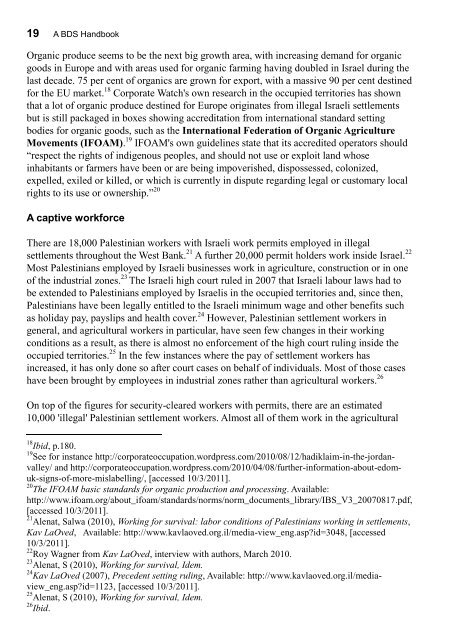- Page 2 and 3: “We, representatives of Palestini
- Page 4 and 5: Targeting Israeli Apartheid: Introd
- Page 6 and 7: Targeting Israeli Apartheid: Credit
- Page 8 and 9: Targeting Israeli Apartheid: About
- Page 10 and 11: Targeting Israeli Apartheid: About
- Page 12: Contents XMapsPage 52Page 195Page 2
- Page 15 and 16: 1 A BDS Handbook1Israel’s Export
- Page 17 and 18: 3 A BDS Handbook2The Effect of the
- Page 19 and 20: 5 A BDS Handbook3Holding CompaniesT
- Page 21 and 22: 7 A BDS Handbook4Banking and Financ
- Page 25: 11 A BDS Handbooksettlements. This
- Page 29 and 30: 15 A BDS HandbookResistanceThe succ
- Page 31: 17 A BDS Handbook60 per cent of Isr
- Page 35 and 36: 21 A BDS Handbookemployed in the ag
- Page 37 and 38: 23 A BDS HandbookOrganisation. 45 T
- Page 39 and 40: 25 A BDS HandbookBeresheet is an Is
- Page 41 and 42: 27 A BDS Handbookin the UK, includi
- Page 44 and 45: Overview of the Israeli Economy: Ag
- Page 46 and 47: Fruits of Apartheid by Sean Michael
- Page 48 and 49: Fruits of Apartheid by Sean Michael
- Page 50: Overview of the Israeli Economy: Ex
- Page 53 and 54: 39 A BDS HandbookAnother major expo
- Page 55 and 56: 41 A BDS Handbookquarries provide n
- Page 57 and 58: 43 A BDS HandbookCemex is a registe
- Page 59 and 60: 45 A BDS Handbookbeen diverse. The
- Page 61 and 62: 47 A BDS Handbook7EnergyThe Israeli
- Page 63 and 64: 49 A BDS HandbookCompany profilesTh
- Page 65 and 66: 51 A BDS Handbookconglomerate contr
- Page 67 and 68: 53 A BDS HandbookAbout 20km off the
- Page 69 and 70: 55 A BDS Handbook8Telecommunication
- Page 71 and 72: 57 A BDS Handbookand Modi’in Illi
- Page 73 and 74: 59 A BDS HandbookPelephone, owned b
- Page 75 and 76: 61 A BDS Handbook9TourismRevenues f
- Page 77 and 78: 63 A BDS Handbookapartheid state. T
- Page 79 and 80: 65 A BDS Handbookseries of guideboo
- Page 81 and 82: 67 A BDS Handbookthe Civic Coalitio
- Page 83 and 84:
69 A BDS HandbookCarmel-Agrexco, Is
- Page 85 and 86:
71 A BDS HandbookList of freight co
- Page 87 and 88:
73 A BDS Handbook11Public Transport
- Page 89 and 90:
75 A BDS HandbookIsrael. Abd al-Wah
- Page 91 and 92:
77 A BDS Handbook12Academia“If in
- Page 93 and 94:
79 A BDS HandbookWindow dressing th
- Page 95 and 96:
81 A BDS HandbookThis move is in li
- Page 97 and 98:
83 A BDS HandbookEven the success o
- Page 99 and 100:
85 A BDS Handbookmay be explained b
- Page 101 and 102:
87 A BDS Handbookand a generator of
- Page 103 and 104:
89 A BDS Handbookcent of Israeli te
- Page 105 and 106:
91 A BDS Handbook14Israel's Settlem
- Page 107 and 108:
93 A BDS Handbookthese changes and
- Page 109 and 110:
95 A BDS Handbookimplications for T
- Page 111 and 112:
97 A BDS HandbookJerusalem […] to
- Page 113 and 114:
99 A BDS HandbookSoda Stream is a m
- Page 115 and 116:
101 A BDS Handbookby both Empire’
- Page 117 and 118:
103 A BDS HandbookAtarot industrial
- Page 119 and 120:
105 A BDS HandbookBio-Lab Ltd is a
- Page 121 and 122:
107 A BDS Handbookhas already split
- Page 123 and 124:
109 A BDS Handbooktrading from Bark
- Page 125 and 126:
111 A BDS HandbookOther companies o
- Page 127 and 128:
113 A BDS HandbookManufacturerMetal
- Page 129 and 130:
115 A BDS HandbookOther companies i
- Page 131 and 132:
117 A BDS HandbookCompanyAtid packa
- Page 133 and 134:
119 A BDS Handbookimportant that ac
- Page 135 and 136:
121 A BDS Handbook
- Page 137 and 138:
123 A BDS Handbook
- Page 139 and 140:
125 A BDS HandbookIsrael has the la
- Page 141 and 142:
127 A BDS HandbookFor example, IAI
- Page 143 and 144:
129 A BDS HandbookElbit Systems, ba
- Page 145 and 146:
131 A BDS HandbookUAVs are one of I
- Page 147 and 148:
133 A BDS Handbookcontracted by the
- Page 149 and 150:
135 A BDS HandbookG4S issued a stat
- Page 151 and 152:
137 A BDS HandbookLocal authority T
- Page 153 and 154:
139 A BDS Handbookis the prime cont
- Page 155 and 156:
141 A BDS HandbookCorporate mercena
- Page 157 and 158:
143 A BDS HandbookManhattan offices
- Page 159 and 160:
145 A BDS Handbook
- Page 161 and 162:
147 A BDS Handbook
- Page 163 and 164:
149 A BDS Handbook16High-TechIsrael
- Page 165 and 166:
151 A BDS HandbookForeign influence
- Page 167 and 168:
153 A BDS HandbookBeyond ICT: ISCAR
- Page 169 and 170:
155 A BDS HandbookJewish forces did
- Page 171 and 172:
157 A BDS HandbookThe Technion in H
- Page 173 and 174:
159 A BDS HandbookOutsourcing the o
- Page 175 and 176:
161 A BDS Handbook17Diamonds“Cont
- Page 177 and 178:
163 A BDS HandbookDan Gertler: Trad
- Page 179 and 180:
165 A BDS HandbookAdumim 31 settlem
- Page 181 and 182:
167 A BDS Handbookstriking workers
- Page 183 and 184:
169 A BDS Handbooksales in North Am
- Page 185 and 186:
171 A BDS HandbookAcloclair, 27 and
- Page 187 and 188:
173 A BDS Handbookstatistic on the
- Page 189 and 190:
175 A BDS HandbookResistanceIn May
- Page 191 and 192:
177 A BDS Handbookgenerics, which c
- Page 193 and 194:
179 A BDS HandbookLandCompanies wit
- Page 195 and 196:
181 A BDS Handbookthe construction
- Page 197 and 198:
183 A BDS HandbookPart Two - Constr
- Page 199 and 200:
185 A BDS HandbookShikun&Benui (Ari
- Page 201 and 202:
187 A BDS HandbookList of companies
- Page 203 and 204:
189 A BDS HandbookPart three - Infr
- Page 205 and 206:
191 A BDS Handbookyet begun. The de
- Page 207 and 208:
193 A BDS HandbookList of companies
- Page 209 and 210:
195 A BDS HandbookPart four - Israe
- Page 211 and 212:
197 A BDS HandbookThe top 50 shareh
- Page 213 and 214:
199 A BDS HandbookCompany Country o
- Page 215 and 216:
201 A BDS HandbookThe part of Gaza
- Page 217 and 218:
203 A BDS Handbooktheatre outside h
- Page 219 and 220:
205 A BDS HandbookPart Five - Real
- Page 221 and 222:
207 A BDS HandbookPoju ZabludowiczP
- Page 223 and 224:
209 A BDS HandbookPart six - Constr
- Page 225 and 226:
211 A BDS HandbookJCB (JC Bamford E
- Page 227 and 228:
213 A BDS Handbookjointly owns Taav
- Page 229 and 230:
215 A BDS Handbook20FranchisesMany
- Page 231 and 232:
217 A BDS HandbookH&M promoting its
- Page 234 and 235:
Part TwoGeographical Case Studies
- Page 236 and 237:
Geographical Case Studies: The Syri
- Page 238 and 239:
Geographical Case Studies: The Syri
- Page 240 and 241:
Geographical Case Studies: The Syri
- Page 242 and 243:
Geographical Case Studies: The Syri
- Page 244 and 245:
Geographical Case Studies: The Jord
- Page 246 and 247:
Geographical Case Studies: The Jord
- Page 248 and 249:
Geographical Case Studies: The Jord
- Page 250 and 251:
Geographical Case Studies: The Jord
- Page 252 and 253:
Geographical Case Studies: The Jord
- Page 254 and 255:
Geographical Case Studies: East Jer
- Page 256 and 257:
Geographical Case Studies: East Jer
- Page 258 and 259:
Geographical Case Studies: East Jer
- Page 260 and 261:
Geographical Case Studies: East Jer
- Page 262 and 263:
Geographical Case Studies: East Jer
- Page 264 and 265:
Geographical Case Studies: East Jer
- Page 266 and 267:
Geographical Case Studies: East Jer
- Page 268 and 269:
Geographical Case Studies: East Jer
- Page 270 and 271:
Geographical Case Studies: The Dead
- Page 272 and 273:
Geographical Case Studies: The Dead
- Page 274 and 275:
Geographical Case Studies: The Naqa
- Page 276 and 277:
Geographical Case Studies: The Naqa
- Page 278 and 279:
Geographical Case Studies: The Naqa
- Page 280 and 281:
Geographical Case Studies: The Naqa
- Page 282 and 283:
Geographical Case Studies: The Naqa
- Page 284 and 285:
Geographical Case Studies: The Naqa
- Page 286 and 287:
Jewish National Fund by Sean Michae
- Page 288:
Jewish National Fund by Sean Michae
- Page 291 and 292:
277 A BDS Handbook26Arms Companies
- Page 293 and 294:
279 A BDS HandbookLockheed Martin w
- Page 295 and 296:
281 A BDS HandbookThe factory can b
- Page 297 and 298:
283 A BDS HandbookRaytheon is the o
- Page 299 and 300:
285 A BDS HandbookBathurst-Norman o
- Page 301 and 302:
287 A BDS Handbooklegal system in N
- Page 303 and 304:
289 A BDS HandbookIsraeli CompanyBA
- Page 305 and 306:
291 A BDS Handbook28BanksBritish ba
- Page 307 and 308:
293 A BDS HandbookThe bank also has
- Page 309 and 310:
295 A BDS Handbooknow resides. 5 Sh
- Page 311 and 312:
297 A BDS HandbookMarks & SpencerM&
- Page 313 and 314:
299 A BDS Handbooksettlement goods)
- Page 315 and 316:
301 A BDS HandbookResistance: The C
- Page 317 and 318:
303 A BDS HandbookCorporate respons
- Page 319 and 320:
305 A BDS HandbookCoffee Co, which
- Page 321 and 322:
307 A BDS Handbook30UniversitiesCor
- Page 323 and 324:
309 A BDS HandbookCompany Details U
- Page 325 and 326:
311 A BDS HandbookCompany Details U
- Page 327 and 328:
313 A BDS HandbookInvestor Investor
- Page 329 and 330:
315 A BDS HandbookRelationships wit
- Page 331 and 332:
317 A BDS Handbook31Pension FundsBr
- Page 333 and 334:
319 A BDS HandbookCompany Details P
- Page 335 and 336:
321 A BDS HandbookXCompany Details
- Page 337 and 338:
323 A BDS HandbookCompany Details P
- Page 339 and 340:
325 A BDS HandbookCompany Details P
- Page 341 and 342:
327 A BDS HandbookCompany Details P
- Page 343 and 344:
329 A BDS Handbook32CharitiesA numb
- Page 345 and 346:
331 A BDS HandbookCharityThe Friend
- Page 347 and 348:
333 A BDS HandbookCharityUK Friends
- Page 349 and 350:
335 A BDS Handbooksupportive commun
- Page 351 and 352:
337 A BDS HandbookThe charities in
- Page 353 and 354:
339 A BDS Handbookeconomical, socia
- Page 355 and 356:
341 A BDS Handbookthe JNF obligated
- Page 357 and 358:
343 A BDS Handbook
- Page 359 and 360:
345 A BDS Handbook
- Page 361 and 362:
347 A BDS HandbookSelect Bibliograp
- Page 363 and 364:
349 A BDS HandbookWho Profits (2011
- Page 365 and 366:
351 A BDS HandbookOccupied Palestin
- Page 367 and 368:
353 A BDS HandbookThe Accords were
- Page 369 and 370:
355 A BDS HandbookWar crime/crime a
- Page 371 and 372:
357 A BDS Handbookarms 1, 79, 115,
- Page 373 and 374:
359 A BDS Handbookconstruction comp
- Page 375 and 376:
361 A BDS HandbookHapoalim 7, 9, 13
- Page 377 and 378:
363 A BDS HandbookKatzrin 48, 51, 1
- Page 379 and 380:
365 A BDS HandbookPACBI (Palestinia
- Page 381 and 382:
367 A BDS HandbookTotal Produce 24t
- Page 383:
369 A BDS Handbook



